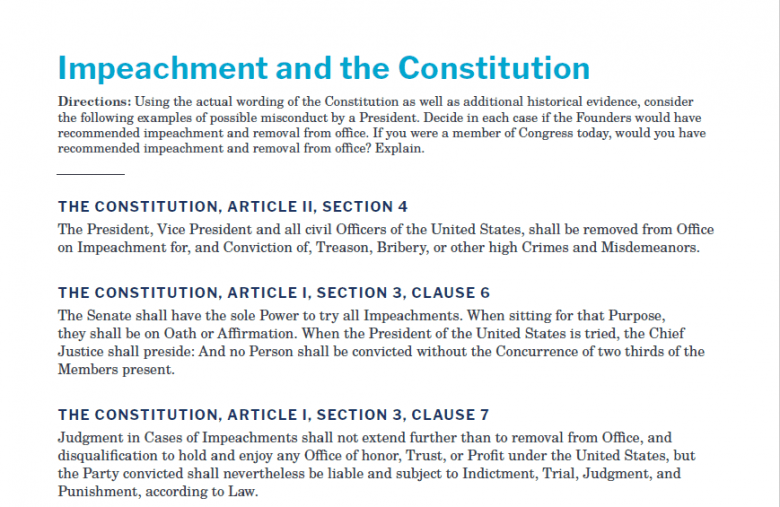Handout A: Impeachment and the Constitution
Impeachment and the Constitution
Directions: Using the actual wording of the Constitution as well as additional historical evidence, consider the following examples of possible misconduct by a President. Decide in each case if the Founders would have recommended impeachment and removal from office. If you were a member of Congress today, would you have recommended impeachment and removal from office? Explain.
THE CONSTITUTION, ARTICLE II, SECTION 4
The President, Vice President and all civil Officers of the United States, shall be removed from Office on Impeachment for, and Conviction of, Treason, Bribery, or other high Crimes and Misdemeanors.
THE CONSTITUTION, ARTICLE I, SECTION 3, CLAUSE 6
The Senate shall have the sole Power to try all Impeachments. When sitting for that Purpose, they shall be on Oath or Affirmation. When the President of the United States is tried, the Chief Justice shall preside: And no Person shall be convicted without the Concurrence of two thirds of the Members present.
THE CONSTITUTION, ARTICLE I, SECTION 3, CLAUSE 7
Judgment in Cases of Impeachments shall not extend further than to removal from Office, and disqualification to hold and enjoy any Office of honor, Trust, or Profit under the United States, but the Party convicted shall nevertheless be liable and subject to Indictment, Trial, Judgment, and Punishment, according to Law.
THE FOUNDERS AND IMPEACHMENT
The specific wording of the infractions for which a President could be impeached was a matter of discussion throughout the Constitutional Convention. The Founders considered the following phrases:
- “malpractice or neglect of duty”
- “incapacity, negligence or perfidy” (deliberate violation of trust)
- “scheme of peculation (misuse of public funds) or oppression”
- “abusing his power”
- “maladministration”
- “other high crimes and misdemeanors against the state”
- “betray[al] of his trust to foreign powers” (treason)
Alexander Hamilton addressed the issue of impeachment in Federalist No. 65, and stated that Presidents could be impeached for:
- “offenses which proceed from the misconduct of public men”
- “abuse or violation of some public trust”
- “injuries done immediately to the society itself.”
- The President sells military secrets to a foreign power.
- The President orders the detention of a racial or ethnic group for national security reasons.
- The President orders the assassination of a foreign leader.
- The President refuses to enforce laws passed by Congress.
- The President participates in a conspiracy to conceal evidence that his associates have committed a burglary.
- In a sexual harassment lawsuit, the President lies under oath.
- The President spends government money for a purpose specifically outlawed by Congress.
- The President lies to the American people to make it appear that military efforts overseas are more successful than they actually are.
- The President takes a lengthy vacation, leaving the country for three months.
- The President is frequently intoxicated.
